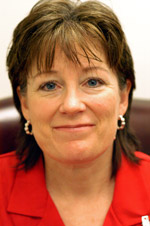
|
|
|
|
Legislative OverviewOn Monday, January 9, the second regular session of Arizona's Fiftieth Legislature convened amid celebration of the state's centennial year. Both chambers performed various perfunctory, ceremonial and housekeeping duties, including the election of leadership. As expected, Senator Steve Pierce (R- LD 1) was elected President of the Senate and Representative Andy Tobin (R- LD 1) was elected Speaker of the House.Also on Monday, Governor Jan Brewer delivered her annual State of the State address to a joint gathering of the House and Senate. Her speech touted accomplishments of her administration and punctuated the historic importance of Arizona's 100th birthday. With respect to policy proposals for the coming year, the Governor's agenda includes: personnel reform for state agencies; repurchase of the Capitol complex (which was previously sold and leased back by the State); and termination of the temporary one-cent sales tax on schedule in 2013. In policy pronouncements following her address, the Governor's office has signaled that it is evaluating a variety of tax reform measures to promote economic growth. A vacancy in the Senate was created when Kyrsten Sinema (D- LD 15) resigned to run for Congress. That vacancy was quickly filled when, on January 11, the Maricopa County Board of Supervisors appointed David Lujan to fill the District 15 seat for the remainder of the term. Lujan, a native of Phoenix, served in the House from 2005-2010. He ran unsuccessfully for Attorney General in 2010. Municipal Water AssessmentThe League is pleased to support the effort of Senator Gail Griffin to repeal the $7 million assessment imposed on cities and towns by the Arizona Department of Water Resources. The assessment (to which the League agreed last year as a one-year measure to help alleviate the state budget crisis) represents an inequitable burden on residents of cities and towns.In response to the senator's specific request, we are asking all cities and towns to contact their legislators to: 1) urge them to sign on to the Griffin bill as a cosponsor, and 2) affirmatively support the measure as it moves through the legislative process. Because the Legislature is in session and bill introduction deadlines are approaching, time is of the essence. Please send copies of your correspondence to both the League (jogsbury@azleague.org) and to Senator Griffin (ggriffin@azleg.gov) so that we can demonstrate the unified support of Arizona's municipalities. Bill IntroductionsAs of 4:00 p.m. on Thursday, 605 bills had been introduced in the House and Senate. Well more than twenty percent of these are in the nature of "technical corrections" measures. These are often vehicles for striker amendments - a method by which new legislative initiatives can be considered after formal bill introduction deadlines have passed.Included among the bills introduced to date are several that have direct impacts on cities and towns. Examples: HB 2021 (municipalities; residential rental property) Municipalities that use the Department of Revenue to collect sales tax for residential rental property are prohibited from requiring property owners to have a municipal license or fingerprint clearance card. HB 2043 (election dates; even-numbered years) Municipal elections can no longer be held in March or May and must be held in even-numbered years. HB 2123 (transaction privilege tax reform committee) Establishes an 11-member Transaction Privilege Tax Reform Committee to study and make recommendations regarding the phasing out of the individual and corporate income tax and the broadening of the TPT base. HB 2169 (building permits; self-certification process) Municipalities are required to give permit applicants the option of obtaining the subject permit through a municipally directed permitting process or through self-certification. SB 1044 (cities; towns; residential rental license) Municipalities cannot impose business license requirements on residential rental property managers. SB 1064 (municipalities; local liberty charter) Establishes a model local liberty charter and authorizes unincorporated areas and municipalities to adopt the charter through municipal legislation or local initiative. SB 1065 (leash law exemption; liability insurance) Municipal ordinances that regulate or prohibit a dog from running at large do not apply if the dog's owner provides proof of canine liability insurance. Military Land ExchangesMost legislative chairmen chose not to convene their committees during the first week of the session. An exception to the rule was Senator John Nelson, whose Committee on Natural Resources and Transportation met on January 9 to consider a pair of companion bills, SB 1001 (military preservation; land exchanges) and SCR 1001 (military preservation; land exchanges). Together, these bills provide expanded authority for the exchange of state trust lands for other public lands to preserve or protect military installations. (SCR 1001 is a ballot referral measure to amend the state constitution - a requisite to effect the provisions of SB 1001.)To promote the interests of our military cities, the League supports the bills, both of which are sponsored by Chairman Nelson. The bills passed out of committee unanimously but were held by the majority caucus committee. Monday TeleconferencesThis year the League will be offering a weekly teleconference to report on the status and impact of various legislative bills in the 2012 session. The calls are scheduled for Monday mornings promptly at 10:00 a.m. (except the first one will be next Tuesday at 10:00 a.m. due to the Martin Luther King, Jr. holiday). Mayors, managers and other city or town staff who are interested in legislative activities are invited to participate. Call-in numbers and a brief agenda will be sent out prior to the calls.Legislative InternThe League is pleased to welcome Ashleen Piercy as its new legislative intern for the 2012 session. Ashleen is a junior at the Barrett Honors College at Arizona State University, studying Political Science and English. A resident of Mesa, Ashleen will be assisting legislative staff with bill tracking, as well as with preparation of the weekly Committee Agendas and the Daily Update.Legislator Profile - Senator Nancy Barto Granted, Senator Barto is most decidedly not a guy, but she is exceedingly nice, and she has never lost an election. Personable, soft-spoken and warm, Senator Barto represents Legislative District 7, comprised of Carefree and Cave Creek, as well as parts of Phoenix and Scottsdale. Although she serves as a freshman in the Senate, she is no stranger to the legislative process, having served in the House from 2006 to 2010. A native of the Chicago area, Senator Barto moved to Arizona as a child when her father was transferred to Phoenix with Motorola. Finding the structured corporate environment of the electronics industry giant not exactly his cup of tea, the salesman, inventor and future business owner moved on to other entrepreneurial adventures to satisfy his visionary bent. She remembers how interested and involved both of her parents were in the process and content of her public education at Kachina Elementary School and Arcadia High School. Her father was especially concerned about the insidious infiltration of a liberal political agenda in scholastic curricula. He also worried over the appearance of revisionist history in textbooks. Accordingly, he established an evaluative system for the review of school library books, to ensure that the shelves weren't stocked with propaganda to undermine American values. At the time, Senator Barto was embarrassed by her parents' visibility and activism. "Other parents didn't do this," she observes. Over time, however, she came to admire and appreciate their involvement and point of view. She was fortunate that they cared enough to take a stand and make a difference. Doubtless, she also appreciates the genes they passed on to her. Her father is now ninety-four years old and still driving; his younger child bride is eighty-eight. Following her graduation from Arcadia, Senator Barto attended Arizona State University, where the musically gifted young woman studied vocal performance. After college, she was ready to settle into the full-time career that was to prove even more rewarding than it was challenging: motherhood. Her partner in this enterprise was Joe, her husband of thirty-three years. Coincidentally, he is from greater Chicago too, and his father also relocated the family to Arizona compliments of Motorola. As a Scottsdale High Beaver, Joe is a product of the same public school system as his wife. In high school Senator Barto met Joe, who works in the semi-conductor industry, at the Lutheran church both their families attended. Senator Barto positively radiates when she talks about her three daughters. "They are awesome girls," she enthuses. One daughter, for example, has worked with girls who have been victimized by prostitution and bondage. "They have real hearts to serve others." They are artistic and service-oriented, and they possess strong values. In other words, they are very much like their mother. "They learned very early on that the world does not revolve around them. They are outward-focused. And they're not afraid to stand up for what's right. They have a strong sense of justice." As Senator Barto speaks these words, her pride in her progeny is almost palpable. As the last of her adult daughters left the nest, Senator Barto felt that she was losing a job. She knew, however, that there was no percentage in mourning the passage of this phase of life. Instead, she rolled up her sleeves, decided to reinvent herself as an educator, and returned to school to get a degree in elementary education. She also ramped up her political activity as the chairman of the Republican organization in Legislative District 7, and she worked tirelessly to build up the party. Senator Barto's plans to teach children were upended when the fates threw her a hanging curveball in 2006. Representative David Burnell Smith vacated his District 7 House seat as a consequence of an investigation into alleged Clean Elections violations. Senator Barto was encouraged to apply for appointment to the vacant House seat. As one who regularly works behind the scenes, Senator Barto had never aspired to public office. "But I'm not one to stand still when I am called," she says. Senator Barto received the House appointment and then went on to win election to the House seat in her own right in November of 2006 and again in 2008. In 2010, she was elected to the Senate with a crushing 67% of the vote. The senator's short time in the upper chamber has been marked by excitement and accomplishment. In particular, she found herself in the national media spotlight as the sponsor and spokesperson for the Health Care Freedom Act, legislation to prevent citizens from being compelled to join a government-run healthcare system. For a period of time during the first regular session of the Fiftieth Arizona Legislature, Senator Barto was hot media property, giving television and radio interviews for major national and regional outlets. Referring to her time on the national stage, she muses, "I probably would have been scared to death if I had ever taken the time to think about what was happening." Curious and open-minded, Senator Barto readily listens to all points of view and maintains an open door policy for her constituent municipalities. She generally agrees that legislators should give local control a chance to work before imposing mandates on cities and towns. Senator Barto is an island of grace and charm situated in a sea sometimes turbid with nasty and hateful politics. She maintains her poise and composure largely because she doesn't take political kerfuffles personally or herself too seriously. Senator Barto is nothing if not civil, and, recognizing that success in legislating is all about relationships, she tries to get along with everybody. "It just doesn't hurt if you're nice," she remarks. Addison "Mort" Walker, the American comic artist, once took exception to Leo Durocher's observation about nice guys. According to Walker, "It's not true that nice guys finish last. Nice guys are winners before the game even starts." By this or nearly any other measure, Senator Nancy Barto is a winner of the first order. |
|
|
Legislative Bulletin is published by the League of Arizona Cities and Towns. Forward your comments or suggestions to league@azleague.org. |